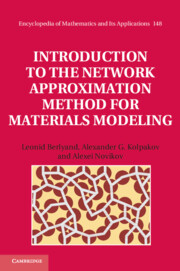Book contents
- Frontmatter
- Contents
- Preface
- 1 Review of mathematical notions used in the analysis of transport problems in densely-packed composite materials
- 2 Background and motivation for the introduction of network models
- 3 Network approximation for boundary-value problems with discontinuous coefficients and a finite number of inclusions
- 4 Numerics for percolation and polydispersity via network models
- 5 The network approximation theorem for an infinite number of bodies
- 6 Network method for nonlinear composites
- 7 Network approximation for potentials of bodies
- 8 Application of the method of complex variables
- References
- Index
5 - The network approximation theorem for an infinite number of bodies
Published online by Cambridge University Press: 05 February 2013
- Frontmatter
- Contents
- Preface
- 1 Review of mathematical notions used in the analysis of transport problems in densely-packed composite materials
- 2 Background and motivation for the introduction of network models
- 3 Network approximation for boundary-value problems with discontinuous coefficients and a finite number of inclusions
- 4 Numerics for percolation and polydispersity via network models
- 5 The network approximation theorem for an infinite number of bodies
- 6 Network method for nonlinear composites
- 7 Network approximation for potentials of bodies
- 8 Application of the method of complex variables
- References
- Index
Summary
In this chapter, we present a method that allows one to obtain an a priori error estimate for the discrete network approximation independent of the total number of filling particles. Such estimates are referred to as homogenization estimates. These estimates can be derived under the natural δ-N close-packing condition (Berlyand and Novikov, 2002), which, loosely speaking, allows for “holes” (regions containing no particles) to be present in the medium of order NR (see Figure 5.1). Here, R is the radius of the particles and N is the number of particles in the perimeter of the largest hole in the conducting cluster (see Figure 5.2). We demonstrate that the error of the network approximation is determined not by the total number of particles in the composite material but by the perimeter of these “holes”. The explicit dependence of the network approximation and its error on the irregular geometry of the particle array is explicitly evaluated.
Formulation of the mathematical model
We consider here the composite material described in Section 3.1.1. It is a two-dimensional rectangular specimen of a two-phase composite material that consists of a matrix filled by a large number of ideally conducting disks that do not intersect. In this chapter, we do not assume any restriction on the number of particles and prove the network approximation theorem independent of the total number of particles.
- Type
- Chapter
- Information
- Publisher: Cambridge University PressPrint publication year: 2012



